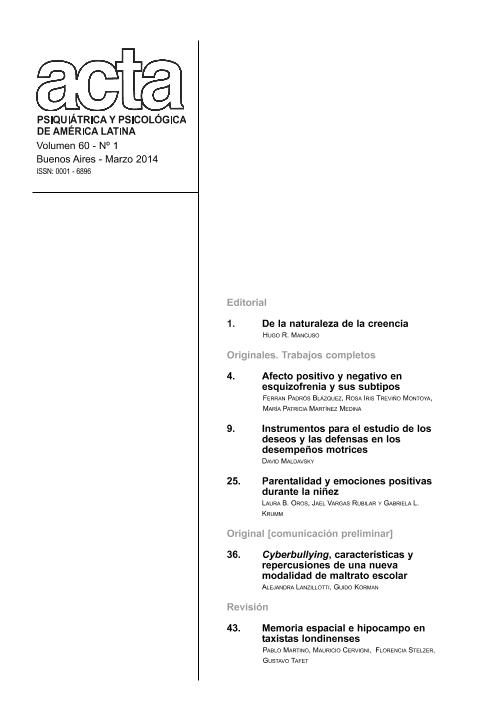Artículo
Introducción. El impacto de la actividad ocupacional y/o profesional sobre el cerebro encuentra sustento en la capacidad del sistema nervioso para modificar su estructura y función, fenómeno denominado plasticidad cerebral. Los taxistas londinenses han permitido examinar dicho suceso. Esto se debe a las exigencias neurocognitivas específicas de la mencionada profesión tanto en el proceso de formación como en la conducción posterior diaria a través de la compleja ciudad de Londres. Objetivo. Revisar estudios empíricos vinculados a taxistas londinenses abordando las variables memoria espacial y la estructura del hipocampo, permitiendo determinar los aportes y limitaciones de esta línea de investigación en el entendimiento de la plasticidad cerebral y en el ejercicio de la rehabilitación neuropsicológica. Desarrollo. Los trabajos revisados coinciden en señalar que las demandas mnésicas espaciales de la conducción en los taxistas londinenses afectan la estructura del hipocampo, con un aumento del volumen de materia gris en su porción posterior y una disminución en su porción anterior. También se reportaron modificaciones en el rendimiento de procesos mnésicos específicos, incrementando el recuerdo asociado a sitios londinenses y en detrimento de la formación de nuevas memorias espaciales. Conclusiones. Los estudios efectuados a taxistas londinenses constituyen un modelo paradigmático en neurociencias para la comprensión de la plasticidad cerebral, haciendo uso de diseños con validez ecológica. Por otro lado se plantean algunos interrogantes necesarios para una adecuada capitalización de sus resultados en el ámbito de la estimulación y rehabilitación neuropsicológica. Introduction. The impact of occupational and / or professional activity on the brain finds support in the nervous system's ability to change its structure and function, a phenomenon known as brain plasticity. London taxi drivers have allowed to discuss that event. This is due to the specific neurocognitive demands of the above mentioned profession both in the process of formation as in the subsequent daily driving through the complex city of London. Objective. Review of empirical studies linked to London taxi drivers by addressing the spatial memory variables and the structure of the hippocampus, to determine the contributions and limitations of this line of research in the understanding of brain plasticity and the exercise of the neuropsychological rehabilitation. Development. The revised studies have noted that spatial mnemonic demands of driving in london taxi drivers affect the structure of the hippocampus, with an increase in the volume of gray matter in their posterior portion and a decrease in its anterior portion. There were also reported changes in the performance of specific memory processes, increasing the memory associated with London sites, and at the expense of the formation of new spatial memories. Conclusions. The studies conducted to London taxi drivers are a paradigmatic model in neuroscience for the understanding of brain plasticity, using ecologically valid designs. On the other hand some necessary questions arise for an adequate capitalization of the results in the field of stimulation and neuropsychological rehabilitation.
Memoria espacial e hipocampo en taxistas londinenses
Título:
Spatial Memory and Hippocampus in London Taxi Drivers
Fecha de publicación:
03/2014
Editorial:
Fundación Acta Fondo para la Salud Mental
Revista:
Acta Psiquiátrica y Psicológica de América Latina
ISSN:
0001-6896
Idioma:
Español
Tipo de recurso:
Artículo publicado
Clasificación temática:
Resumen
Archivos asociados
Licencia
Identificadores
Colecciones
Articulos(CCT - MAR DEL PLATA)
Articulos de CTRO.CIENTIFICO TECNOL.CONICET - MAR DEL PLATA
Articulos de CTRO.CIENTIFICO TECNOL.CONICET - MAR DEL PLATA
Citación
Martino, Pablo; Cervigni, Mauricio Alejandro; Stelzer, Florencia; Tafet, Gustavo; Memoria espacial e hipocampo en taxistas londinenses; Fundación Acta Fondo para la Salud Mental; Acta Psiquiátrica y Psicológica de América Latina; 60; 1; 3-2014; 43-51
Compartir




